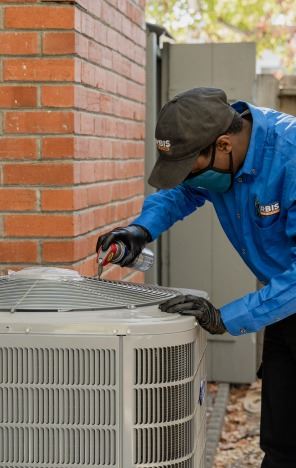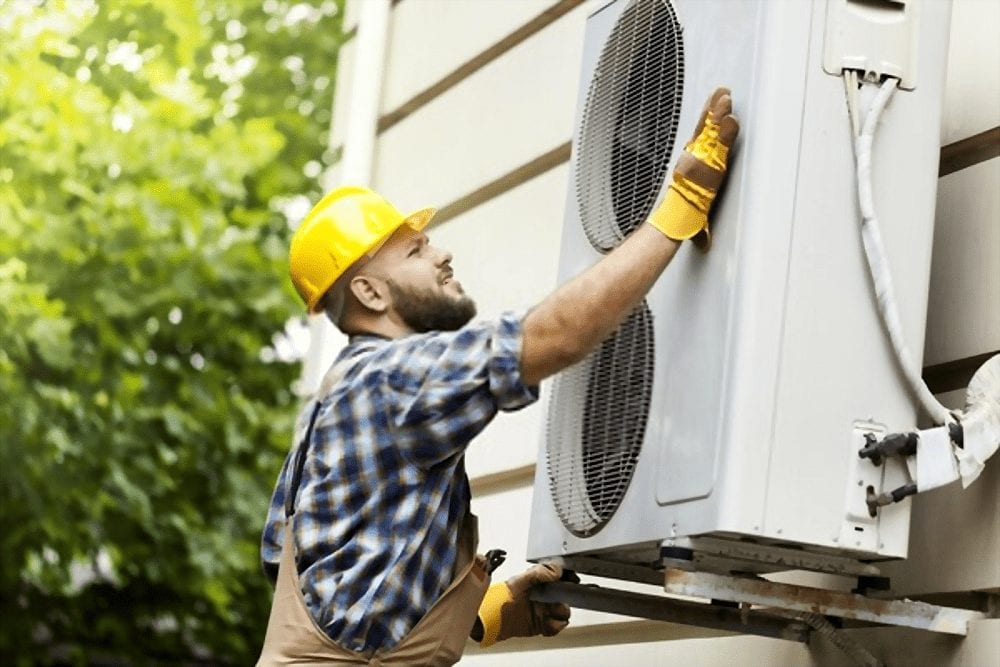Selecting Between a Heatpump and Furnace: Secret Factors To Consider for Your Heating And Cooling Demands
When assessing home heating alternatives for heating and cooling needs, the choice between a warmth pump and a heating system can be complex. Each system provides distinct advantages customized to details environments and power efficiency goals. Recognizing these differences is crucial for making an enlightened choice. Secret variables such as installation expenses and ecological influence additionally complicate the option process. Which choice really aligns with one's comfort and sustainability preferences? The following sections will discover these factors to consider in detail.
Recognizing Heat Pumps: Just How They Function and Their Benefits
While many home owners consider numerous heating alternatives, recognizing how warmth pumps function and their advantages can substantially influence their choice. Warm pumps run by transferring heat instead of producing it. In the winter season, they draw out heat from the outdoors air or ground and transfer it inside your home, while in the summer, they reverse this procedure, cooling the home by expelling heat outside. This double capability makes them functional for year-round environment control.One of the main benefits of heat pumps is their power performance. They utilize significantly less electrical energy compared to conventional heating unit, possibly leading to lower utility costs (furnace replacement). In addition, warmth pumps have a smaller sized carbon impact, making them an environmentally friendly option. They additionally call for less upkeep than standard systems, adding to long-term expense savings. On the whole, recognizing the auto mechanics and advantages of heatpump can aid house owners make educated choices concerning their heating and cooling needs
Discovering Furnaces: Types, Operation, and Advantages
Heating systems can be found in various kinds, consisting of gas, electric, and oil models, each with distinctive functional systems. Recognizing these differences is necessary, as they affect effectiveness and heating efficiency. In addition, heating systems offer numerous advantages, such as constant heat outcome and dependability in colder climates.
Sorts of Heaters
Heater can vary significantly in style and operation, with furnaces being a prominent option among homeowners. There are several kinds of heaters, each making use of various gas resources and innovations. Gas heating systems are common, leveraging all-natural gas to generate warmth successfully. Electric furnaces, on the various other hand, make use of electric resistance to generate heat, often favored for their uncomplicated installation. Oil heaters, while less typical, work in locations with restricted gas access (heat pump replacement ooltewah tn). In addition, condensing furnaces make best use of power effectiveness by capturing and reusing exhaust gases. Each kind operates with a system of warmth exchangers and ductwork to distribute cozy air throughout a home. Comprehending the differences between these furnace types is necessary for informed HVAC choices
Benefits of Heating systems
For homeowners seeking reliable warmth throughout cool months, the benefits of heaters are significant. Heaters supply consistent home heating, guaranteeing also temperatures throughout the home. They are particularly reliable in extreme cold, usually outperforming warm pumps in cold problems. Various types, consisting of gas, electric, and oil heating systems, supply flexibility to fulfill varied demands and preferences.Furnaces likewise have a tendency to have lower initial setup expenses compared to heatpump, making them a more accessible option for lots of. Their durable design adds to a much longer life-span, with several systems lasting over 15 years with correct upkeep. Furthermore, modern heaters are usually equipped with sophisticated innovation for enhanced efficiency, which can lead to reduced power costs. Generally, heating systems stay a dependable choice for reliable home heating.

Energy Effectiveness: Comparing Heat Pumps and Furnaces
When comparing power efficiency in between warm pumps and furnaces, the Seasonal Energy Performance Proportion (SEER) plays an essential duty in identifying performance. Furthermore, an operational cost evaluation exposes the long-term monetary implications of each system. Recognizing these factors can guide house owners in making educated choices concerning their home heating solutions.
Seasonal Power Efficiency Proportion
Energy performance plays a necessary role in the decision-making process between heatpump and heaters, specifically when thinking about the Seasonal Energy Effectiveness Ratio (SEER) This metric actions the cooling efficiency of warm pumps over an entire air conditioning season, providing a standard way to examine performance. Higher SEER ratings suggest higher power efficiency, equating to lower energy usage and minimized energy costs. On the other hand, heaters are generally assessed utilizing the Yearly Gas Application Efficiency (AFUE) rating, which mirrors home heating performance. When comparing these 2 systems, home owners need to focus on SEER scores for warm pumps, as they directly influence total power financial savings and environmental sustainability. A comprehensive understanding of SEER can significantly affect the lasting fulfillment and cost-effectiveness of the selected HVAC remedy.
Functional Price Evaluation
Recognizing the functional expenses related to warm pumps and furnaces is vital for home owners examining their options. Heatpump commonly use higher energy performance, converting electric power into warm with very little waste. This results in reduced regular monthly utility expenses, specifically in moderate climates. Conversely, typical furnaces, especially gas designs, might have reduced ahead of time prices but can incur greater operational costs with time as a result of fuel rates and efficiency ratings.Moreover, warm pumps can function as both heating and cooling down systems, potentially reducing the requirement for separate cooling and heating systems. While first financial investments for heatpump may be greater, their lasting financial savings in power efficiency can make them a much more economical choice for numerous families. Mindful evaluation of neighborhood energy rates is necessary to establish the best choice.
Installation Expenses: What to Expect for each and every Heating System
Setup prices for home heating systems can differ considerably between heatpump and heating systems, influencing property owners' decisions. Warmth pumps normally have greater in advance installation prices, normally varying from $3,500 to $8,000, depending upon the device dimension and intricacy of setup. This consists of the exterior system, indoor handling system, and essential ductwork alterations. Alternatively, furnaces often tend to have reduced preliminary expenses, balancing between $2,500 and $6,000, which can be appealing for budget-conscious house owners. Nevertheless, installation expenses can raise if extensive ductwork is required.Moreover, the choice of gas type for heaters-- gas, lp, or electrical-- can additionally influence installment costs. While warm pumps offer power performance, their first investment might deter some buyers. Eventually, examining installment expenses together with long-term savings and efficiency will certainly aid home owners in making informed choices regarding their furnace.
Environment Considerations: Which System Does Better in Your Location
Exactly how do climate problems influence the effectiveness of heater? The efficiency of warmth pumps and heating systems can differ greatly relying on the neighborhood environment. In modest climates, heatpump excel by efficiently moving heat from the outside air, making them an energy-saving option. Their performance lessens in exceptionally cool temperature levels, where they may struggle to extract enough heat. Conversely, furnaces, especially gas models, give reputable and regular heat no matter outside conditions, making them better in cooler regions.In locations that experience milder winters months, heat pumps can operate successfully year-round, offering both heating & cooling. In comparison, areas with harsh winter seasons usually gain from the toughness of heaters. Inevitably, recognizing the regional climate is vital when making a decision in between a warmth pump and a heating system, as it directly affects their operational efficiency and overall efficiency.
Upkeep Demands: Long-Term Look After Warmth Pumps vs. Furnaces
While both warm pumps and heating systems require normal maintenance to assure peak efficiency, her explanation their specific requirements and treatment routines differ significantly. Heaters generally need less regular focus, with annual examinations being adequate to look for gas leaks, clean filters, and analyze total performance. Their less complex layout often allows for uncomplicated repairs.In contrast, heat pumps demand semiannual maintenance because of their double function in heating and air conditioning. This consists of cleansing coils, examining refrigerant degrees, and guaranteeing that both the exterior and indoor systems function at their finest. Furthermore, heatpump maintenance often includes more detailed parts, making specialist servicing essential.Neglecting upkeep can bring about diminished effectiveness and look at this web-site raised energy prices for both systems. Eventually, house owners must think about these lasting treatment demands when selecting in between a warm pump and a heater, as proactive upkeep can prolong the lifespan and efficiency of either system substantially.
Environmental Effect: Picking a Lasting Home Heating Choice
The environmental impact of heater is a vital analysis for home owners looking for sustainable choices. Warmth pumps are normally extra energy-efficient than standard heating systems, as they transfer warm rather than generate it, greatly decreasing carbon discharges. By making use of renewable resource sources, such as air-source or geothermal heatpump, property owners can even more decrease their eco-friendly footprint.On the other hand, gas furnaces visit their website emit greenhouse gases and add to air pollution, though they frequently provide greater heat result. Nonetheless, innovations in modern technology have actually led to the growth of high-efficiency furnaces that minimize emissions.Ultimately, choosing a furnace entails evaluating efficiency against environmental effect. House owners are motivated to reflect on neighborhood energy resources and rewards for eco-friendly systems, making sure a selection that lines up with both individual comfort and environmental duty. The decision influences not just immediate convenience however also lasting sustainability and environmental health and wellness.
Often Asked Concerns
The Length Of Time Do Warmth Pumps and Furnaces Commonly Last?
The lifespan of heatpump commonly varies from 15 to two decades, while heaters can last in between 15 to 30 years. Normal maintenance substantially affects their longevity and performance in supplying home heating solutions.
Can I Utilize a Heatpump in Extremely Cold Climates?
Warm pumps can run in incredibly chilly environments, but their performance decreases as temperature levels decline. In such problems, extra home heating resources may be required to maintain comfortable indoor temperatures and ensure peak efficiency.

What Is the Sound Degree of Warm Pumps Versus Furnaces?
The noise levels of heat pumps and heating systems vary considerably. Typically, heatpump run even more silently than typical heaters, making them better for those sensitive to seem, while heaters may create louder operational sounds during home heating cycles.
Are Heat Pumps Suitable for Both Heating and Air conditioning?
Heat pumps are without a doubt appropriate for both cooling and heating (heat pump installation ooltewah tn). They operate by moving heat, supplying efficient temperature level control year-round, making them a flexible selection for house owners looking for an all-in-one a/c solution
What Size Heater Do I Required for My Home?
Determining the ideal size heater for a home needs evaluating elements such as square video, insulation quality, local climate, and the home's layout. Consulting a professional can guarantee an exact evaluation and perfect comfort. Heat pumps commonly supply higher energy efficiency, converting electric energy into warmth with marginal waste. In modest climates, warm pumps stand out by effectively transferring heat from the outside air, making them an energy-saving choice. On the other hand, furnaces, particularly gas versions, give regular and reliable heat regardless of outdoor conditions, making them more effective in cooler regions.In locations that experience milder wintertimes, warm pumps can run properly year-round, supplying both home heating and air conditioning. Warm pumps are usually more energy-efficient than conventional heating systems, as they transfer heat rather than generate it, greatly decreasing carbon discharges. By using renewable power resources, such as air-source or geothermal warmth pumps, property owners can further minimize their eco-friendly footprint.On the various other hand, natural gas furnaces emit greenhouse gases and add to air pollution, though they usually supply higher heat result.